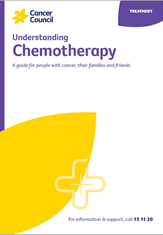- Home
- Cancer Information
- Cancer treatment
- Chemotherapy
- Managing side effects
Managing side effects
Chemotherapy drugs can damage healthy, fast-growing cells, such as the new blood cells in bone marrow or cells in the mouth, stomach, skin, hair and reproductive organs. When healthy cells are damaged, it causes side effects. This section provides information and tips to help you manage some common side effects of chemotherapy.
Learn more about:
- Preparing for side effects
- Blood-related side effects
- Feeling tired and lacking energy
- Hair loss
- Appetite changes, nausea or vomiting
- Constipation or diarrhoea
- Nerve and muscle effects
- Thinking and memory changes
- Mouth sores
- Skin and nail changes
- Sexuality and fertility issues
- Other side effects
Preparing for side effects
Everyone reacts to chemotherapy differently. Some people have no side effects, others have many. Whether you experience side effects and how severe they are depends on the type and dose of drugs you are given and your reaction from one treatment cycle to the next.
If you have side effects, they may start during the first few weeks of treatment and occasionally become more intense with each treatment cycle. Before treatment begins, your doctor, pharmacist or nurse will discuss the side effects to watch out for or report, how to help prevent or manage them, and who to contact after hours if you need help.
Recording side effects
It can be useful to keep a record of your chemotherapy treatment and any side effects you develop. This will help you recall details about when you had side effects, how long they lasted and what helped to make them better. Some people use a notebook or a diary, while others prefer to use an app on a smartphone or tablet. Tell your treatment team about all side effects. They will be able to suggest ways to manage the side effects or, if appropriate, they may adjust your treatment.
How long side effects may last
Most side effects are short term, but some may be permanent. Side effects tend to gradually improve once treatment stops and the normal, healthy cells recover. Most side effects can be managed.
Some side effects from chemotherapy may not show up for many months or years. These are called late effects. Before treatment starts, talk to your doctor about whether you are at risk of developing late effects and what you can do to help prevent them.
Long term and late effects of treatment
Permanent side effects of chemotherapy may include damage to your heart, lungs, kidneys, nerve endings or reproductive organs. If damage to your heart muscle or lungs is a possibility, your doctor will monitor your heart and lung function and adjust your chemotherapy if early changes are seen.
Occasionally, many years after having chemotherapy, some people develop a new, unrelated cancer. The risk of this is very low, but factors such as continuing to smoke or rare genetic conditions can increase this risk. If any symptoms appear, even many years after treatment, ask your GP whether they could be related to the cancer treatment you received. Ask whether your hospital has a late effects clinic to help you manage any side effects you may experience after treatment.
For more on this, see Living well after cancer.
Keep a list of the doses and names of your chemotherapy drugs, along with the names of your specialists. This will save time if you become ill and need to visit the emergency department. Make sure to tell the hospital staff that you are having chemotherapy.
Podcast for people affected by cancer
Listen now
More resources
Prof Timothy Price, Medical Oncologist, The Queen Elizabeth Hospital, SA; Graham Borgas, Consumer: Dr Joanna Dewar, Medical Oncologist and Clinical Professor, Sir Charles Gairdner Hospital and The University of Western Australia, WA; Justin Hargreaves, Medical Oncology Nurse Practitioner, Bendigo Health Cancer Centre, VIC; Angela Kritikos, Senior Oncology Dietitian, Dietetic Department, Liverpool Hospital, NSW; Dr Kate Mahon, Director of Medical Oncology, Chris O’Brien Lifehouse, NSW; Georgie Pearson, Consumer; Chris Rivett, 13 11 20 Consultant, Cancer Council SA; Marissa Ryan, Acting Consultant Pharmacist (Cancer Services), Pharmacy Department, Princess Alexandra Hospital, QLD.
View the Cancer Council NSW editorial policy.
View all publications or call 13 11 20 for free printed copies.
Need to talk?
Support services
Coping with cancer?
Ask a health professional or someone who’s been there, or find a support group or forum
Looking for transport, accommodation or home help?
Practical advice and support during and after treatment
Cancer information
Managing cancer side effects
Detailed information on coping with the most common side effects experienced by people with cancer
View our publications
Guides and fact sheets for people with cancer, their families and friends

